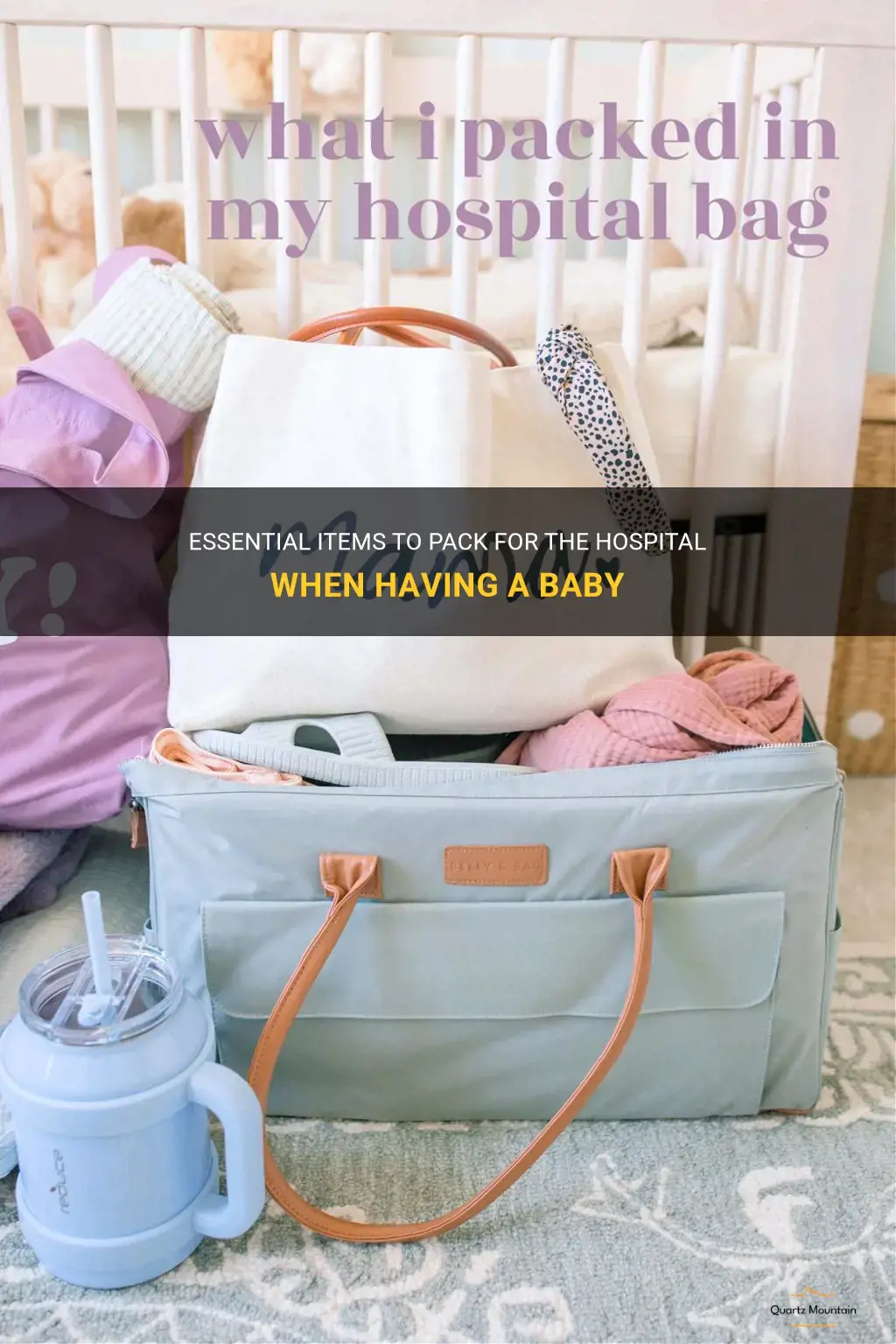
Preparing to have a baby is an exciting and nerve-wracking time, filled with anticipation and endless to-do lists. One important task that shouldn't be overlooked is packing a hospital bag. When the big day arrives, having essential items ready can make the hospital stay more comfortable and stress-free. From comfortable clothes to toiletries and important paperwork, ensuring you have everything you need is crucial. So, let's dive into the world of packing a hospital bag and discover the essential items to bring along for this life-changing journey.
What You'll Learn
- What essential items should I pack for my baby's hospital stay?
- Are there any specific clothing items or blankets that I should bring for my baby?
- What toiletries or hygiene products should I pack for my baby's hospital stay?
- Are there any specific items or equipment that I should bring for breastfeeding or bottle feeding?
- Are there any special items or comfort items that I should pack to help make my baby's hospital stay more comfortable?

What essential items should I pack for my baby's hospital stay?
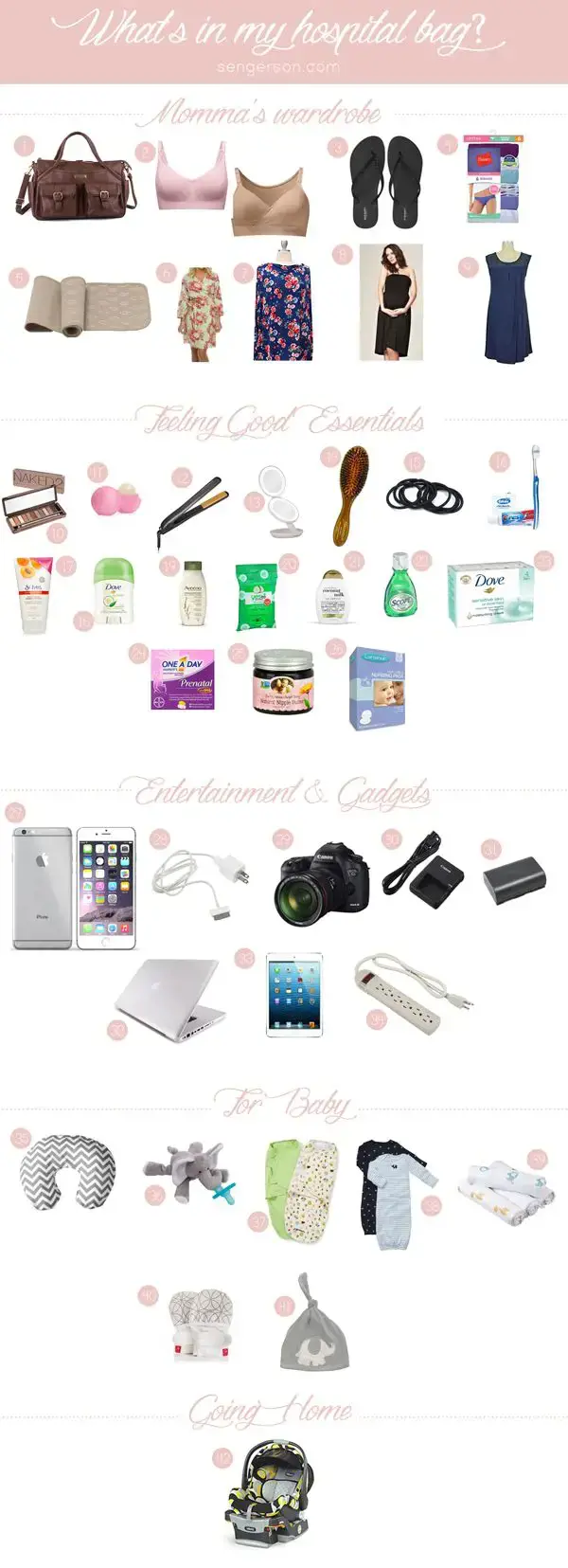
When it comes to packing for your baby's hospital stay, it's important to be prepared with essential items that will help keep your baby comfortable and make your stay as stress-free as possible. Here are some of the must-have items to pack:
- Clothing: Pack several sets of comfortable clothing for your baby, including onesies, sleepers, and socks. Keep in mind that hospitals can be cool, so pack some warm layers as well. It's a good idea to have a mix of newborn and 0-3 month sizes, as you may not know how big your baby will be until they arrive.
- Swaddling blankets: Swaddling can help your baby feel secure and sleep better. Pack a few soft and lightweight swaddling blankets to help recreate the cozy environment of the womb.
- Diapers: The hospital will provide diapers during your stay, but it's always a good idea to pack a few extras. Choose newborn-sized diapers to ensure a proper fit.
- Wipes: Pack a travel-sized package of baby wipes for diaper changes and general clean-up. Opt for wipes that are gentle on your baby's skin and free of any harsh chemicals or fragrances.
- Hat and mittens: Newborns often have trouble regulating their body temperature, so pack a hat to keep their head warm. Mittens can also be useful to prevent your baby from scratching themselves with their nails.
- Burp cloths: Your baby will likely have frequent spit-ups, so pack a few burp cloths to help keep both you and your baby clean and dry. Look for absorbent and easy-to-clean cloths.
- Pacifiers: Pacifiers can be soothing for babies, so pack a few in case your baby needs some extra comfort. Make sure they are sterilized and ready to use.
- Baby toiletries: Bring travel-sized baby shampoo, lotion, and baby wash for your baby's first bath at the hospital. It's also a good idea to bring a soft towel or blanket for drying your baby.
- Feeding supplies: If you plan to breastfeed, bring nipple cream and breast pads. If you're formula-feeding, bring enough pre-mixed formula or bottles with powdered formula and clean water.
- Going-home outfit: Choose a special outfit for your baby's trip home. Keep in mind that it should be comfortable and weather-appropriate for the time of year.
Remember to pack these items in a diaper bag or small suitcase that is easy to carry and keep organized. It's also a good idea to label all of your baby's belongings with their name to avoid any mix-ups during your stay.
Overall, being well-prepared with these essential items will help ensure a smooth and comfortable hospital stay for both you and your baby.
The Must-Have Items to Pack for a Danube River Cruise
You may want to see also

Are there any specific clothing items or blankets that I should bring for my baby?
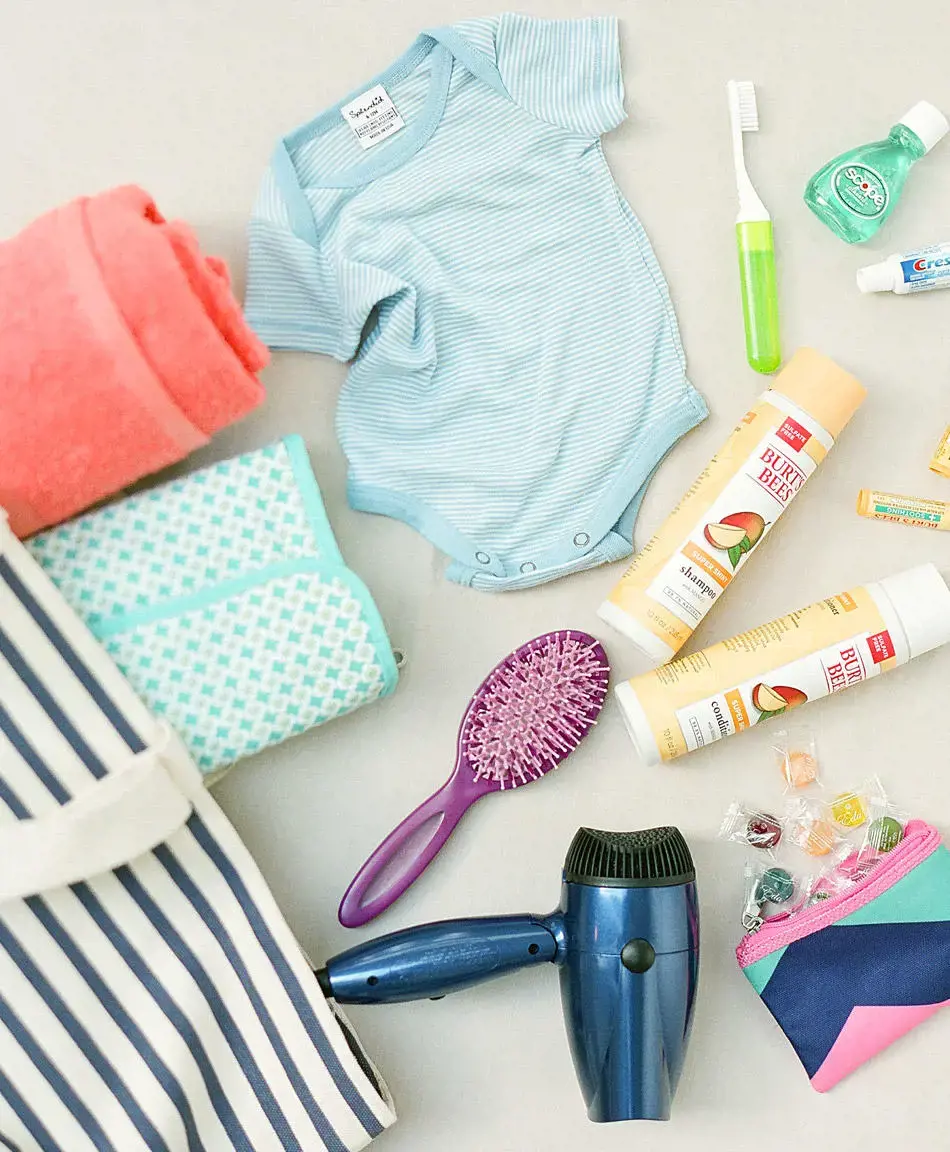
When it comes to caring for a newborn baby, there are certainly essential items that you should have on hand. Clothing and blankets are an important part of keeping your baby comfortable, warm, and protected. In this article, we will discuss the specific clothing items and blankets that you should have for your baby.
- Bodysuits or Onesies: Bodysuits or onesies are a staple in your baby's wardrobe. These one-piece garments are comfortable and easy to put on and take off. They provide coverage for the baby's torso and can be layered with other clothing items depending on the temperature. Look for onesies with snap closures at the crotch area for easy diaper changes.
- Sleepers or Pajamas: Sleepers or pajamas are essential for your baby's bedtime routine. These full-body garments help keep your baby warm and cozy during sleep. Choose sleepers made of a soft and breathable fabric like cotton, and opt for ones with snap or zipper closures for easy access.
- Hats: Newborns have a more difficult time regulating their body temperature, so it's important to keep their heads covered. Hats can help keep your baby warm during colder weather or in air-conditioned environments. Choose hats that are soft, comfortable, and provide enough coverage for the baby's ears.
- Socks or Booties: Little feet can quickly get cold, so it's important to keep them covered. Socks or booties can help keep your baby's feet warm and protected. Look for socks or booties that are soft, stretchy, and easy to put on and take off.
- Swaddling Blankets: Swaddling is a common practice in newborn care as it helps mimic the feeling of being in the womb and provides a sense of security for the baby. Swaddling blankets are large, lightweight, and made of breathable fabric. They should be large enough to fully wrap around your baby and secure with Velcro or snaps.
- Receiving Blankets: Receiving blankets are versatile and can be used for a variety of purposes. They can be used to swaddle your baby, provide a clean surface for diaper changes, or provide a layer of warmth in a stroller or car seat. Look for receiving blankets made of a soft and durable material.
- Sleep Sacks: Sleep sacks, also known as wearable blankets, are a safe alternative to loose blankets in the crib. These zip-up garments provide warmth and comfort while allowing room for your baby to kick and move around. Choose sleep sacks that are the appropriate size for your baby and made of a breathable fabric.
When choosing clothing items and blankets for your baby, it's important to prioritize comfort, safety, and ease of use. Avoid clothing items with hard buttons or decorations that may irritate your baby's delicate skin. Opt for blankets and clothing made of natural, breathable fabrics like cotton to help regulate your baby's body temperature.
In conclusion, there are several specific clothing items and blankets that you should have for your baby. Bodysuits or onesies, sleepers or pajamas, hats, socks or booties, swaddling blankets, receiving blankets, and sleep sacks are all essential items to keep your baby comfortable, warm, and protected. By having these items on hand, you will be well-prepared to care for your newborn baby's needs.
Essential Items to Include in Your Bag for Residential Eating Disorder Treatment
You may want to see also

What toiletries or hygiene products should I pack for my baby's hospital stay?
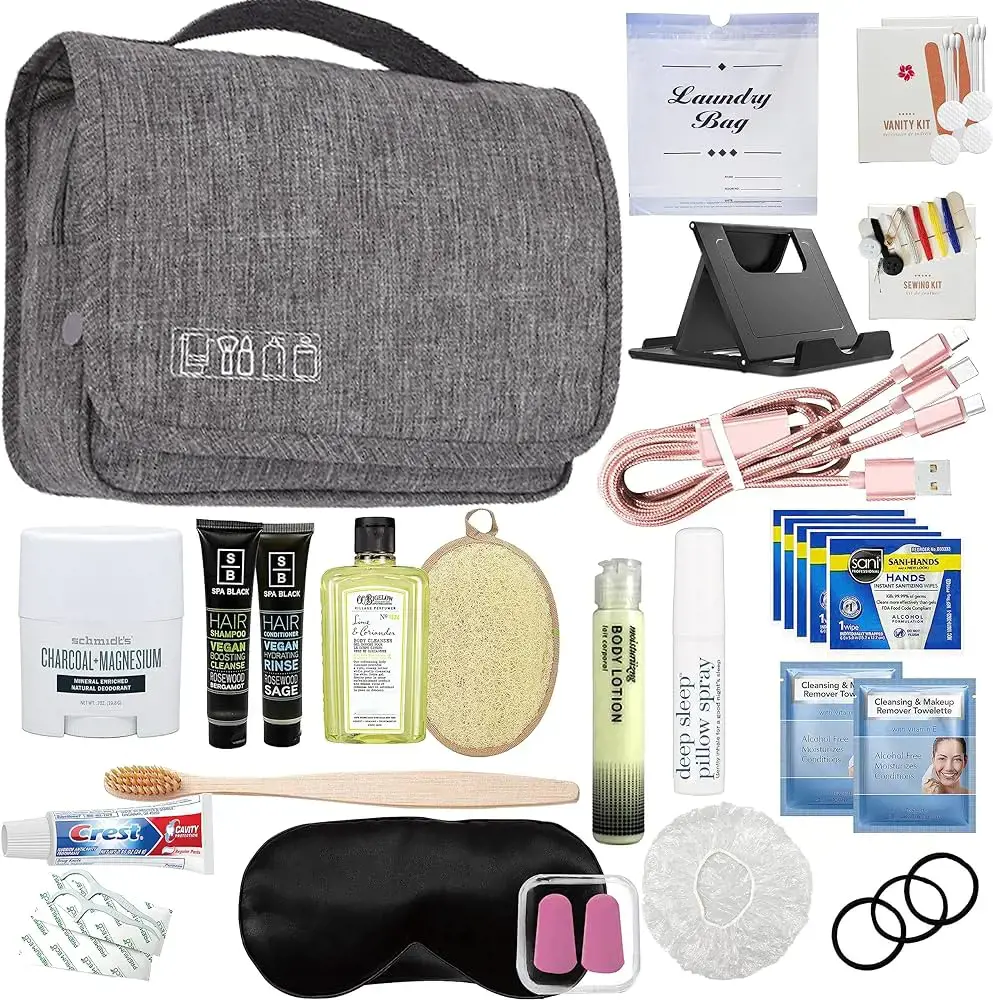
Having a baby is an exciting and joyous time, but it also requires careful planning and preparation, especially when it comes to the baby's hospital stay. Knowing what toiletries and hygiene products to pack can help ensure that your baby stays clean and comfortable during their time at the hospital. Here are some essential items to include in your hospital bag for your baby's hygiene needs.
- Diapers: This is perhaps the most important item to pack for your baby's hospital stay. Make sure to pack enough diapers to last at least a few days, as newborns tend to go through several diapers in a day. It's also a good idea to pack some newborn-sized diapers, as many hospitals provide larger-sized diapers that might not fit your baby properly at first.
- Wipes: Alongside diapers, baby wipes are a must-have item for maintaining good hygiene. Choose wipes that are gentle on your baby's sensitive skin and are free of harsh chemicals or fragrances. These wipes can be used for diaper changes, cleaning your baby's face and hands, and even wiping down surfaces in the hospital room if needed.
- Changing pad: Packing a portable changing pad can come in handy during your baby's hospital stay. It provides a clean and comfortable surface for diaper changes, ensuring that your baby stays clean and germ-free while at the hospital.
- Diaper cream: To prevent diaper rash or soothe any existing irritation, pack a diaper cream specifically designed for babies. Look for a cream that is safe and gentle for newborns and free of any potential allergens or irritants.
- Baby lotion: Hospitals can be dry environments, and your baby's delicate skin may need some extra moisture. A mild and hypoallergenic baby lotion can help keep your baby's skin soft and moisturized during their stay.
- Baby soap or cleanser: It's important to keep your baby's delicate skin clean, even while in the hospital. Pack a gentle baby soap or cleanser that is specifically formulated for newborns. Opt for a product that is free of harsh chemicals, fragrances, and dyes to minimize the risk of irritation.
- Baby washcloths and towels: Pack a few soft and absorbent washcloths and towels for bathing your baby. These items should be gentle on your baby's skin and free of any potential irritants. Having a designated set of washcloths and towels for your baby will ensure that they stay clean and hygienic during their hospital stay.
- Nail clippers or files: Newborn babies often have soft and delicate nails that can quickly grow long and sharp. Including a pair of baby nail clippers or files in your hospital bag will allow you to keep your baby's nails trimmed and prevent them from scratching their delicate skin.
Remember, every baby's needs are unique, so it's essential to consider any specific recommendations or restrictions from your healthcare provider. By packing these essential toiletries and hygiene products, you can help ensure that your baby stays clean, comfortable, and healthy during their hospital stay.
The Essential Packing List for Two Weeks in Kauai
You may want to see also

Are there any specific items or equipment that I should bring for breastfeeding or bottle feeding?
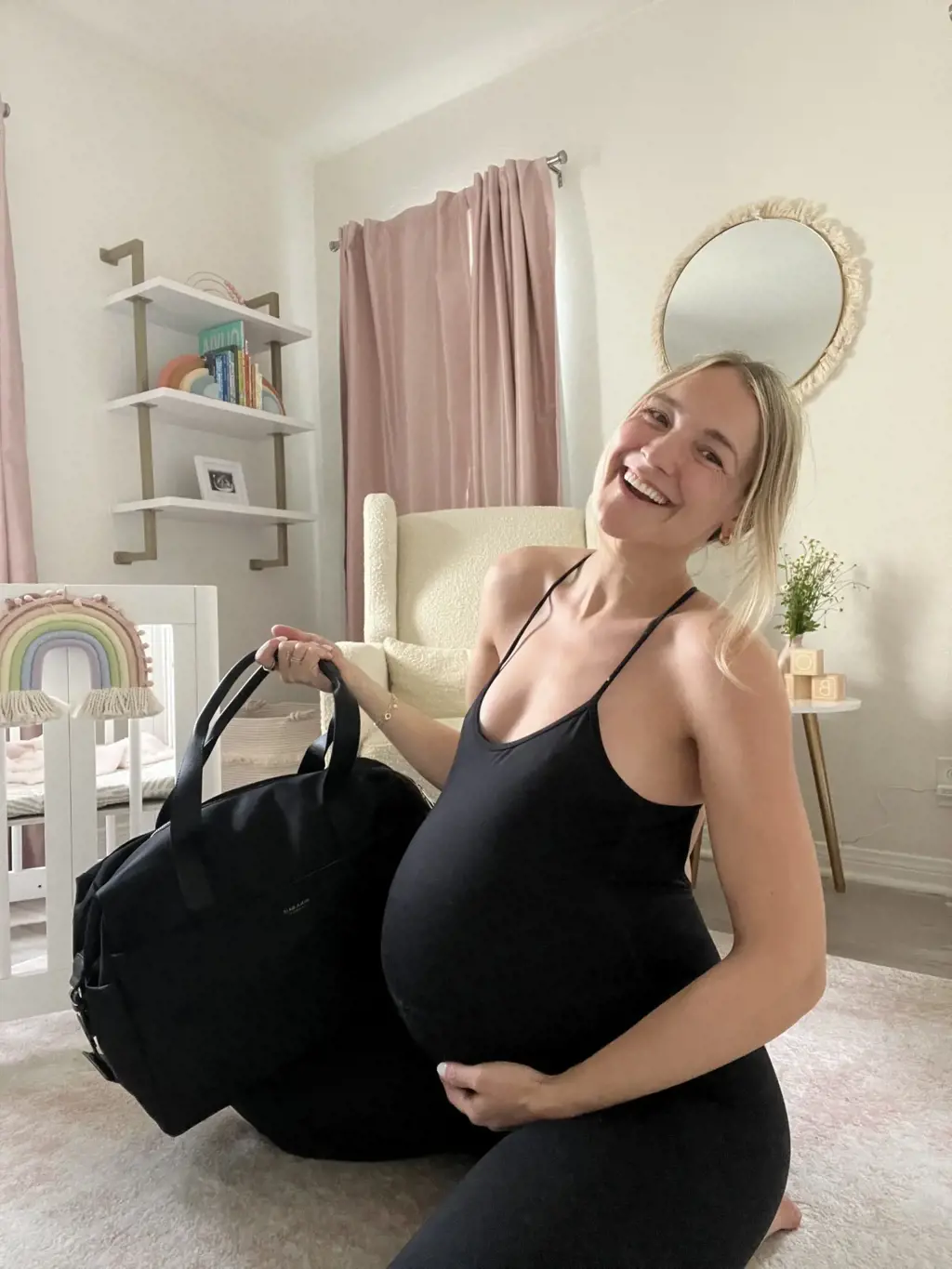
When it comes to breastfeeding or bottle feeding your baby, there are a few items and equipment that can make the process easier and more convenient for both you and your little one. While it's not necessary to have all of these items, they can certainly enhance your feeding experience and help you feel more prepared.
For breastfeeding, some essential items include:
- Nursing bras: These bras are designed to provide easy access for breastfeeding, usually with a clip or snap mechanism on the front. They offer support and comfort while allowing you to easily nurse your baby.
- Nursing tops or shirts: These tops feature hidden openings or flaps that allow easy access for breastfeeding. They are typically made from soft, stretchy fabric that provides comfort and convenience.
- Nursing pads: These pads are placed inside your bra to absorb any leaking breast milk. They help prevent embarrassing stains on your clothing while keeping you comfortable and dry.
- Breast pump: A breast pump can be useful for expressing milk if you need to be away from your baby for an extended period of time or if you have low milk supply. There are manual and electric options available, depending on your preference and needs.
- Milk storage bags or containers: If you plan on pumping and storing breast milk, you'll need containers or bags specifically designed for this purpose. These ensure that your milk stays fresh and safe for your baby to consume.
- Nursing pillow: A nursing pillow provides support and helps position your baby during breastfeeding. It can relieve strain on your arms, neck, and back, making feeding more comfortable for both you and your baby.
For bottle feeding, here are some valuable items to have on hand:
- Bottles and nipples: It's important to have a good supply of bottles and nipples on hand for feeding your baby. Opt for products that are BPA-free and easy to clean.
- Bottle brush: This specialized brush is designed to clean the inside of bottles thoroughly. It usually has a small, sponge-like head that easily reaches all corners and crevices of the bottle.
- Sterilizer: A sterilizer is a convenient and efficient way to clean and sanitize bottles, nipples, and other feeding equipment. It uses steam or heat to kill bacteria and other germs, ensuring that your baby's bottles are safe for use.
- Formula dispenser: If you plan on using formula, a formula dispenser is a handy tool to have. It allows you to pre-measure and store individual servings of formula, making feeding on the go or during the night much easier.
- Bottle warmer: A bottle warmer heats up your baby's milk to a comfortable temperature quickly and safely. This is particularly helpful for night feedings when you want to minimize the time your baby spends awake.
Remember, every parent and baby is different, so you should adjust your feeding supplies based on your own preferences and needs. Some parents may find additional items, such as nursing covers or burp cloths, to be helpful during feeding sessions. It's all about finding what works best for you and your baby.
In conclusion, while there is no specific equipment or items that are absolutely necessary for breastfeeding or bottle feeding, having certain supplies on hand can make the process more comfortable and convenient. Consider investing in these items to help support your feeding journey and make the experience more enjoyable for both you and your baby.
Essential Items to Pack for a Hotel Stay with an Indoor Waterpark
You may want to see also

Are there any special items or comfort items that I should pack to help make my baby's hospital stay more comfortable?
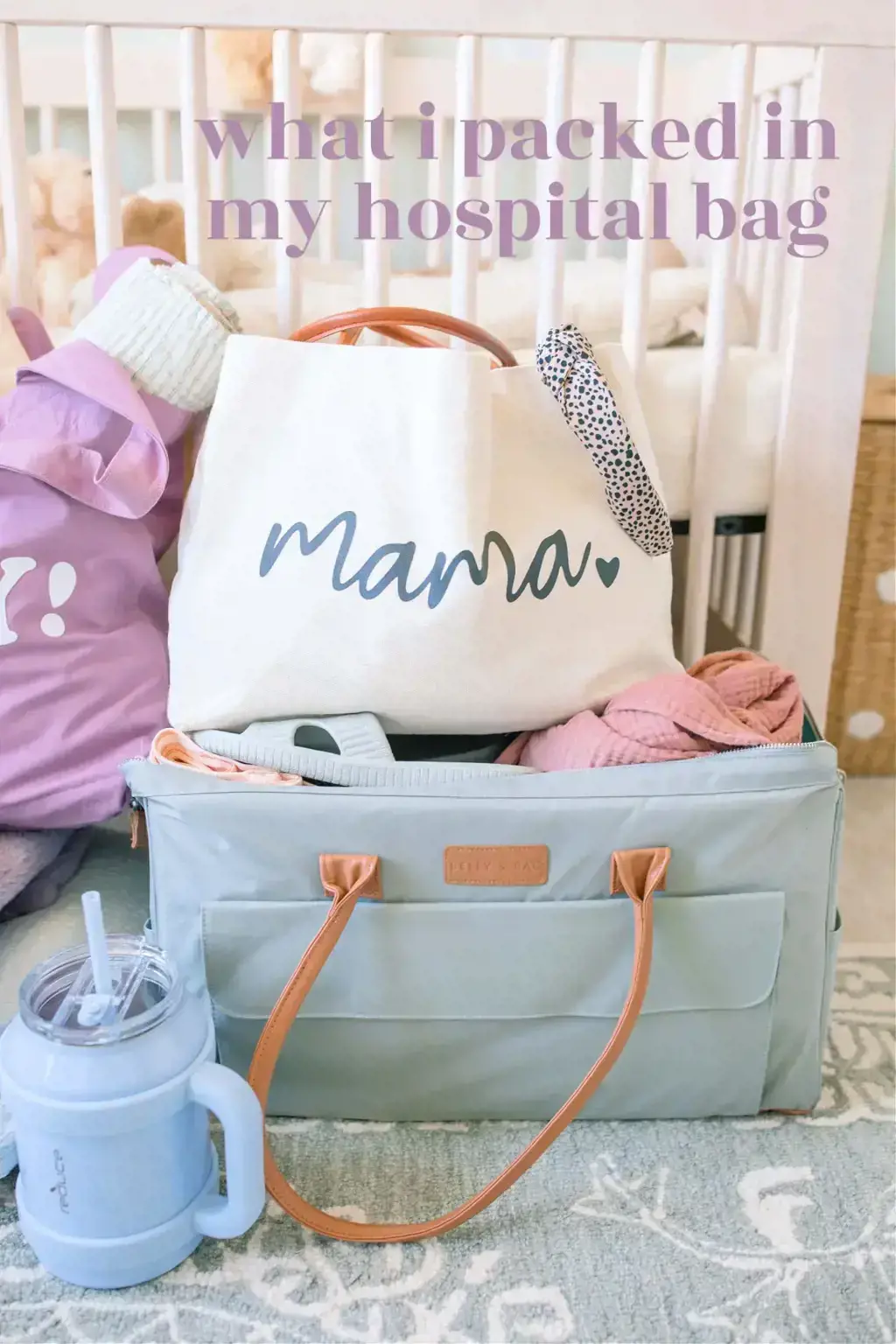
When it comes to packing for your baby's hospital stay, it's important to consider items that will make your baby as comfortable as possible. Here are some special items and comfort items to pack:
- Soft Blankets: Bringing along a few soft blankets will help provide comfort and warmth for your baby during their hospital stay. Hospitals can be chilly, so having an extra layer of warmth can be soothing for your little one.
- Favorite Toy or Comfort Object: If your baby has a favorite toy or comfort object, it can help provide a sense of familiarity and security during their hospital stay. This can be especially helpful if your baby is feeling anxious or scared.
- Pacifiers: Pacifiers can be a great source of comfort for babies. If your baby uses a pacifier, be sure to pack a few extras in case they get lost or dirty during the hospital stay. This can help soothe your baby and provide them with a sense of security.
- Comfortable Clothing: Pack a few sets of comfortable clothing for your baby, including onesies, soft pajamas, and socks. This will help keep your baby cozy and comfortable throughout their hospital stay. Opt for clothing items that are easy to put on and take off, as you may need to change your baby's clothes frequently.
- Swaddling Blankets: Swaddling can help calm and comfort babies, especially newborns. Packing a couple of swaddling blankets can be useful in creating a cozy and secure environment for your baby. They can also help regulate your baby's body temperature, which is important for their well-being.
- Breastfeeding Supplies: If you plan on breastfeeding your baby during their hospital stay, be sure to pack any necessary supplies. This may include nursing bras, breast pads, nipple cream, and a breast pump (if needed).
- Personal Care Items: Don't forget to pack basic personal care items for your baby, such as diapers, wipes, and baby lotion. Having these items on hand will help ensure your baby stays clean and comfortable throughout their hospital stay.
While these are just a few ideas for special items and comfort items to pack, it's important to keep in mind that every baby is different. Consider your baby's individual needs and preferences when deciding what to pack for their hospital stay. Ultimately, the goal is to create a comfortable and soothing environment for your baby during this time.
Essential Items to Pack for Your Trip to Nigeria
You may want to see also
Frequently asked questions
When packing clothes for your baby's hospital stay, it is important to consider comfort and practicality. Pack a few onesies or bodysuits, as these are easy to dress and change your baby in. Additionally, bring a couple of pairs of socks and a hat to keep your baby's head warm. Depending on the climate and season, you may also want to pack a light sweater or jacket. Remember to choose clothes that are easy to take off and put on, as newborns tend to need frequent diaper changes.
Most hospitals provide diapers and wipes for your baby during their stay. However, it is always a good idea to pack a small travel pack of diapers and wipes, just in case. This can be especially helpful if you have a specific brand or type of diapers that you prefer for your baby. It is better to be prepared and have extra supplies on hand rather than not have enough during your baby's stay at the hospital.
Apart from clothes and diapers, there are a few other essentials that you should pack for your baby's hospital stay. Be sure to bring a receiving blanket or swaddle, as this can help keep your baby cozy and secure. It is also a good idea to pack a few burp cloths or muslin cloths for any spit-up or spills. Additionally, you may want to bring a pacifier, if you plan to use one, along with any necessary baby toiletries such as baby shampoo and lotion. Lastly, don't forget to pack a going-home outfit for your baby, which can be a special and memorable part of their hospital stay.







